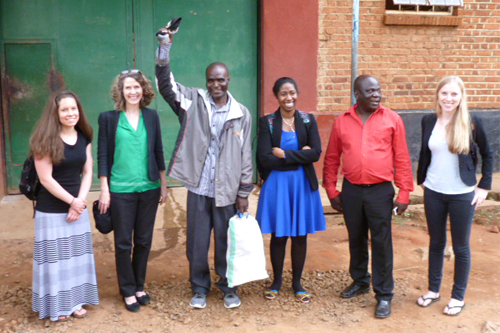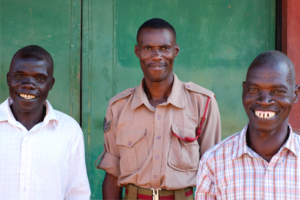This website uses cookies
We use cookies to ensure that we give you the best experience on our website. If you continue to use this site we will assume that you are happy with it.

Sandra Babcock (second from left) and students from the Cornell Center on the Death Penalty Worldwide in Malawi.
On May 2, the Malawi Resentencing Project was announced as one of the five winners of the World Justice Challenge 2019: Access to Justice Solutions, a competition to identify, recognize, and promote good practices and successful solutions to improve access to justice. A partnership between the Cornell Center on the Death Penalty Worldwide, the Malawi Legal Aid Bureau, and Reprieve, the Malawi Resentencing Project seeks justice for death row inmates in the country.
In 2007, the High Court of Malawi issued a judgment striking down the country’s mandatory death penalty for homicide and entitling every person then on death row to a new sentencing hearing. Due to the meager budget of Malawi’s justice system, however, this undertaking presented a formidable challenge.
 The Malawi Resentencing Project was launched in 2014 to address this challenge. The Cornell Center on the Death Penalty Worldwide joined a coalition of stakeholders in devising an innovative plan to train paralegals, lawyers, judges, and mental health workers. Working with the judiciary, the project also proposed creative strategies to streamline the resentencing process and conserve resources.
The Malawi Resentencing Project was launched in 2014 to address this challenge. The Cornell Center on the Death Penalty Worldwide joined a coalition of stakeholders in devising an innovative plan to train paralegals, lawyers, judges, and mental health workers. Working with the judiciary, the project also proposed creative strategies to streamline the resentencing process and conserve resources.
Thanks to these efforts, Malawi courts have thus far held 158 resentencing hearings. After hearing the life stories of the prisoners and weighing the circumstances of the offenses, the courts reduced the sentences of every single prisoner. None were resentenced to death. As of June 2019, a total of 142 prisoners have been released into the care of their families and communities, where paralegals trained through the project have conducted “community sensitization” to ease the former inmates’ reintegration and reduce their risk of recidivism.
“I was thrilled to learn that the Malawi Resentencing Project had won the World Justice Challenge award,” says Center Director Sandra Babcock. “I spent several years working with local partners in Malawi to implement the project, and the award is an important recognition of our collaborative, long-term approach to overcoming barriers to justice.”
Each of the World Justice Challenge winning projects received a $10,000 prize in recognition of its achievement and impact. Babcock notes, “The grant monies will be held by the Malawi Legal Aid Bureau to support the defense of prisoners unjustly sentenced to death.”
Meanwhile, the project’s success is bolstering further work by the Center, which is the first in the United States to focus on the intersection between the global and domestic movements to abolish the death penalty.
“We are now building on the Malawi model in Tanzania, where — with the help of Cornell law students — we are representing a number of death row prisoners before the African Court on Human and Peoples’ Rights,” says Babcock. “We are urging the African Court to consider the positive jurisprudence generated by our project, in the hope that the principles adopted by the Malawian courts may ultimately affect the application of the death penalty across the continent.”